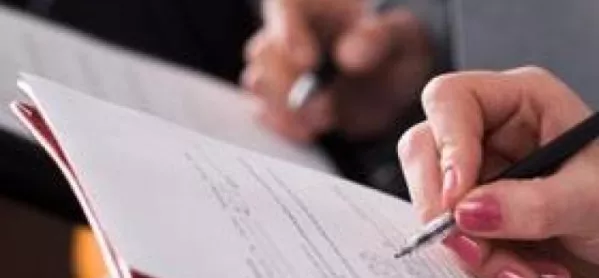- Home
- Covid-19 GCSE grades: No checks for bias within schools
Covid-19 GCSE grades: No checks for bias within schools

England’s exams regulator has rejected the option of delving into school level GCSE and A-level grades this year to check for potential bias, it revealed today.
Concerns that the teacher-assessed grades could lead to an unfavourable bias against particular ethnic groups have been raised ever since they were announced as a replacement for this summer’s cancelled exams.
Coronavirus: Fears schools may ‘exploit’ GCSE grading
Related: Coronavirus GCSEs: Year 10s could get grades after all
Coronavirus: Teachers to rank order pupils for GCSEs
Analysis: Are teacher-assessed GCSE grades a good idea?
An Ofqual consultation on the grading process published tonight says that one way of correcting for bias would be looking at a school’s grades and “statistically adjusting the standard being applied to different groups of students (for example by SES [socio-economic status], SEND, ethnicity and gender)”.
“This would be done to replicate historical patterns of results for the different groups,” the regulator suggests.
But it says it does not want to use the approach, which would be “based on the perhaps questionable assumption that any difference in patterns found this year would reflect bias rather than the likely outcome had examinations proceeded as planned”.
The absence of checks within schools’ grading decisions may cause some concern.
Earlier this month, racial equality think tank The Runnymede Trust wrote to education secretary Gavin Williamson, calling on him to ensure that pupils from disadvantaged or BAME backgrounds did not receive predicted grades that did not reflect their true potential.
The trust’s deputy director, Zubaida Haque, said: “A generation of young people could lose out on opportunities for their future because of Covid-19 if we don’t act now.”
Ofqual was worried that the method it has rejected could have led to changes in the rank order of students that schools are being asked to produce for each qualification, with some candidates promoted or demoted on the basis of ethnicity, gender, social class or special needs.
“The final calculated grades received would no longer reflect the centres’ judgements about the relative grade worthiness of individual students,” the regulator says.
The Ofqual document states that schools have been asked to “make a fair and objective judgement” of the grades they feel pupils would have achieved had this year’s exams not been cancelled, but acknowledges that “it is possible some degree of bias may remain in these judgements”.
It plans to do two things to counter this. The first is checking overall results to check a school’s grades are “largely maintained from previous years”.
But Ofqual admits: “This way of mitigating the effects of bias assumes that [school] level demographics are stable over time.”
The second is that when choosing its technical method of standardising grades it will model the impact on schools with different pupil backgrounds.
“Where possible, technical choices will be made to ensure so far as is possible that students are not systematically advantaged or disadvantaged on the basis of their socio-economic background or their protected characteristics,” Ofqual says.
In a literature review accompanying its consultation, Ofqual concludes that the differences between teacher-assessments and exam results “can sometimes be linked to student characteristics like gender, special educational needs, ethnicity and age but the effects, when present, are small and inconsistent across subjects”.
The review cites studies that found disadvantaged students and those from black and Asian backgrounds were more likely to be over-predicted for their A-level grades. However, higher-attaining disadvantaged students were more likely to be under-predicted than their wealthier peers.
Under Ofqual’s plans students will not be able to appeal their teachers’ assessed grades for their performance or their position in their school’s rank order this summer.
“We propose instead that appeals should be made to exam boards by centres, on behalf of one or more of their students, on the grounds that the wrong information was used to generate calculated grades or that a mistake was made when the exam board standardised the grade or communicated the grades to the centre,” the consultation says.
Ofqual reasons that “there is no common benchmark or standard against which teachers’ professional judgements, or a centre’s evaluation and use of those judgements in centre assessment grades, can be evaluated”.
It said appeals that involved scrutinising teachers’ professional judgement would “be inappropriate, ineffective and unfair in the current exceptional circumstances”.
Keep reading for just £1 per month
You've reached your limit of free articles this month. Subscribe for £1 per month for three months and get:
- Unlimited access to all Tes magazine content
- Exclusive subscriber-only stories
- Award-winning email newsletters



